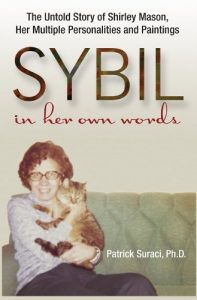This book is about the person at the heart of one of the most notorious cases in modern times of someone suffering from Dissociative Identity Disorder (formerly known as Multiple Personality Disorder) - Sybil.
Based on taped conversations that Patrick Suraci had with Shirley Mason (known to the world as “Sybil”) from 1993 until her death in 1998, the book reveals the untold story of Sybil’s life.
This new information about Sybil’s early years, her psychoanalysis, and the integration of her sixteen personalities has never before been disclosed to the public.
One hundred reproductions of paintings from the Sybil years are presented and interpreted. Most of them have never been seen by the general public.
Previously unreleased photographs of Shirley Mason at various ages are presented. Shirley’s cousin also provided Dr. Suraci with letters written by Shirley. Included is a photograph of Shirley with her painting at The National Arts Club on Gramercy Park where she won the student competition while attending Columbia University and undergoing psychoanalysis in New York in 1955.
Sybil’s story is very much alive today. CBS aired a new TV movie on June 7, 2008, based on Flora Rheta Schreiber’s book, “SYBIL”, starring Jessica Lange as “Dr. Wilbur” and Tammy Blanchard as “Sybil”.
Her story is so compelling because of the rarity of her complete integration of all sixteen personalities. For almost half her life she lived under the shadow of multiple personality symptoms such as black outs, fugue state and amnesia. After her cure the second part of her life was thrust into glaring light of reality of the world. Although she was known to almost everyone as the troubled Sybil of the book and movie, she was known to her colleagues as a remarkable teacher, a gifted artist, a devoted friend and a generous spirit.
New details about the nature of Shirley’s recovery and treatment as written in Flora Schreiber’s book are uncovered. The reader will also discover the remarkable friendship and relationship that Shirley had with her former therapist, Dr. Cornelia Wilbur. This relationship resulted in Shirley taking care of Dr. Wilbur after she had a stroke. It only ended with Dr. Wilbur’s death.
“SYBIL in her own words” explores the continuing controversy about dissociative identity disorder, its cures, its causes and its place in modern popular culture, in no small part due to the overwhelming popularity of Sybil’s enduring story.
It’s a book about why these subjects - Sybil and Dissociative Identity Disorder - continue to intrigue us, and what they say about our own nature, our own place in the world, our own society.
Based on taped conversations that Patrick Suraci had with Shirley Mason (known to the world as “Sybil”) from 1993 until her death in 1998, the book reveals the untold story of Sybil’s life.
This new information about Sybil’s early years, her psychoanalysis, and the integration of her sixteen personalities has never before been disclosed to the public.
One hundred reproductions of paintings from the Sybil years are presented and interpreted. Most of them have never been seen by the general public.
Previously unreleased photographs of Shirley Mason at various ages are presented. Shirley’s cousin also provided Dr. Suraci with letters written by Shirley. Included is a photograph of Shirley with her painting at The National Arts Club on Gramercy Park where she won the student competition while attending Columbia University and undergoing psychoanalysis in New York in 1955.
Sybil’s story is very much alive today. CBS aired a new TV movie on June 7, 2008, based on Flora Rheta Schreiber’s book, “SYBIL”, starring Jessica Lange as “Dr. Wilbur” and Tammy Blanchard as “Sybil”.
Her story is so compelling because of the rarity of her complete integration of all sixteen personalities. For almost half her life she lived under the shadow of multiple personality symptoms such as black outs, fugue state and amnesia. After her cure the second part of her life was thrust into glaring light of reality of the world. Although she was known to almost everyone as the troubled Sybil of the book and movie, she was known to her colleagues as a remarkable teacher, a gifted artist, a devoted friend and a generous spirit.
New details about the nature of Shirley’s recovery and treatment as written in Flora Schreiber’s book are uncovered. The reader will also discover the remarkable friendship and relationship that Shirley had with her former therapist, Dr. Cornelia Wilbur. This relationship resulted in Shirley taking care of Dr. Wilbur after she had a stroke. It only ended with Dr. Wilbur’s death.
“SYBIL in her own words” explores the continuing controversy about dissociative identity disorder, its cures, its causes and its place in modern popular culture, in no small part due to the overwhelming popularity of Sybil’s enduring story.
It’s a book about why these subjects - Sybil and Dissociative Identity Disorder - continue to intrigue us, and what they say about our own nature, our own place in the world, our own society.






